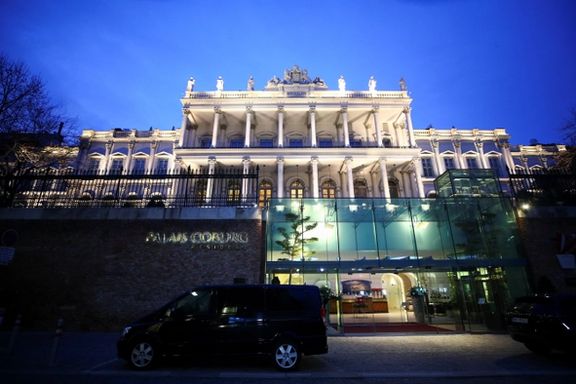Iran Says Sanctions Moved To Top Of Agenda In Vienna Talks

Iran’s nuclear talks resumed Monday with formal discussions between remaining members of the 2015 deal, the JCPOA, with Washington due to take part indirectly.

Iran’s nuclear talks resumed Monday with formal discussions between remaining members of the 2015 deal, the JCPOA, with Washington due to take part indirectly.
In Washington, White House press secretary Jen Psaki said that the US remained committed to securing Tehran’s “full compliance” with the JCPOA (Joint Comprehensive Plan of Action).
The Wall Street Journal is among US media uneasy over President Joe Biden’s handling of Iran. “For months the US has been all but begging Iran to return to the table, though the US won’t literally even be at the table in Vienna,” a Journal editorial noted Monday, “so American negotiators must work through European intermediaries. The US seems undeterred by this intentional humiliation.”
The Vienna talks Monday involved China, France, Germany, Iran, Russia, and the United Kingdom. Afterwards, Ali Bagheri Kani, Iran’s lead negotiator, claimed they had focused on lifting US sanctions, with a working group starting work immediately. He portrayed this as a significant victory for Iran.
“It is a major achievement that all parties in the meeting accepted Iran’s demand that first the situation of illegal and unjust US sanctions...should be cleared and then (we) discuss other issues,” Bagheri Kani told reporters.

Enrique Mora, the European Union official chairing the talks, gave a welcome to proceedings, which began amid growing pessimism over prospects.
"I feel extremely positive about what I have seen today," Mora said, suggesting the Iranians had not rejected outright the results of the previous six rounds of talks held April-June under the previous Iranian administration of President Hassan Rouhani. "They have accepted that the work done over the first six rounds is a good basis to build our work ahead.”
The earlier talks had struggled to agree which US sanctions levied since previous US president Donald Trump left the JCPOA in 2018 were incompatible with the deal, as well as how exactly Iran would curb the nuclear program it has expanded since 2019, including by enriching uranium to 60 percent, far above the 3.67 percent allowed under the JCPOA.
“We will be of course incorporating the new political sensibilities of the new Iranian administration," Mora said.
Testing
This was the first round of talks since the Vienna process lapsed in June, as Iran suspended its participation after its presidential election. With many members of the new administration of President Ebrahim Raisi (Raeesi) known to be critics of the JCPOA, today was the first chance to test Tehran’s new negotiators.
Bagheri Kani had specifically said Iran required guarantees that the US will not again leave an agreement and impose fresh sanctions.
But while all remaining JCPOA signatories argue formally that both the US and Iran should return to the terms of the deal, there have been growing differences in approach between, on one side, the three European signatories (the E3) and, on the other, Russia and China.
Russia recently played down International Atomic Energy Agency (IAEA) concerns over Iran, while Wang Qun, China’s IAEA envoy last week linked the Vienna talks to the Aukus atomic submarine deal between the US, UK and Australia.
Comments from US officials reflect that the EU-US relationship has warmed since Trump left office, and as European concerns grow over the expanding Iranian nuclear program and Tehran’s restriction on its cooperation with the IAEA.
Leverage
"If Iran thinks it can use this time to build more leverage and then come back and say they want something better, it simply won't work. We and our partners won't go for it," Rob Malley, the US special envoy for Iran, told the BBC Saturday.
Biden officials have stressed their consultation not just with the E3 but with Israel, which has opposed the JCPOA. Israel’s foreign minister Yair Lapid warned in London Monday that Iran would "play for time, earn billions from the removal of sanctions, continue to deceive the world and covertly advance the nuclear program."
Iran has been increasingly wary of the Europeans, especially in their criticizing Iran through IAEA country-level meetings. But Europe still hopes to bring all parties together and revive the JCPOA. French President Macron held a 90-minute phone call Monday afternoon with Raisi, the official Iranian news agency reported.